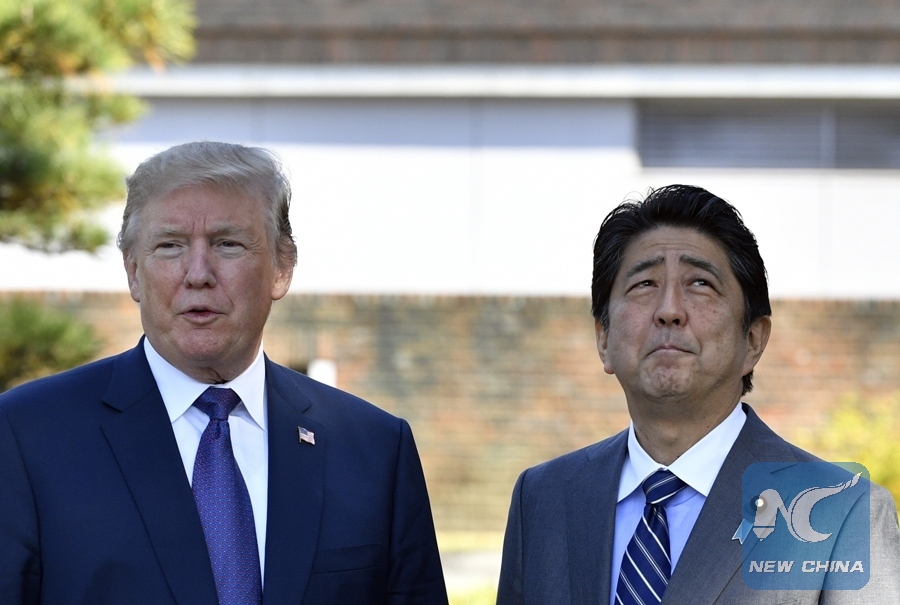
File Photo: U.S. President Donald Trump (L) meets with Japanese Prime Minister Shinzo Abe upon his arrival at the Kasumigaseki Country Club in Kawagoe, near Tokyo, Japan, Nov. 5, 2017. (Xinhua)
WASHINGTON, June 6 (Xinhua) -- As Japanese Prime Minister Shinzo Abe departed on Wednesday to visit the White House for talks with U.S. President Donald Trump, analysts here said the tour, the second in two months, is unlikely to dispel bilateral mistrust on the issues concerning the Democratic People's Republic of Korea (DPRK) and trade.
Before travelling to Canada for the Group of Seven (G7) summit, Abe will meet Trump on June 7, as part of a trip largely expected to reaffirm Japan's stances on the denuclearization of the Korean Peninsula and trade in Washington and Quebec before Trump's scheduled meeting with DPRK top leader Kim Jong Un on June 12 in Singapore.
MISSION OF REASSURANCES
Abe's trip to the White House has widely been seen as a bid to seek reassurances from Trump to stand with Japan in his meeting with Kim.
Specifically, Tokyo expected Trump to reiterate its demand that Pyongyang abandon its nuke programs as well as all of its medium and long-range ballistic missiles that could cover Japan once triggered.
Abe also expected Trump to urge Kim to release the Japanese citizens allegedly abducted in the country. Trump vowed to put forward the issue to Kim while meeting with Abe at his Mar-a-Lago resort in April.
A sense of insecurity or fear for being marginalized in future talks concerning the Korean Peninsula has fretted Tokyo amid the fast-changing chemistry between Pyongyang and Washington lately, as indicated in their "positive" meetings in New York, Singapore and inter-Korean border, as well as in Trump's remarks hinting the possible signing of a peace treaty with Kim after meeting with Kim Yong Chol, vice chairman of the Central Committee of the DPRK's ruling Workers' Party of Korea, last week.
Jenna Gibson, communications director at the Washington-based non-profit Korea Economic Institute (KEI), told Xinhua that "the fact that Abe is rushing to Washington on the eve of the summit, the second visit in just two months, says a lot about how insecure he feels in terms of getting his policy priorities on the agenda."
"Whether or not it's true, from a public relations perspective Abe looks desperate to meet with Trump and be included in policymaking in the region," she said. "If Abe gets the last word before the summit, there is a better chance that his priorities, including issues like the abductees, will stick in Trump's mind when he arrives in Singapore."
For now, the United States and Japan remain divergent on the issue of the abductees, Gibson added.
"Addressing the Japanese abductees who were taken by the North Koreans is a high priority for Japan, and for Abe personally. In principle, the U.S. agrees that North Korea should address the issue, but doesn't see it as a top priority in the same way that Abe does," she explained.
Douglas Paal, vice president for studies at the Carnegie Endowment for International Peace, also saw Abe's visit to Washington as "a mission of reassurance."
"It is ... not to change the script," he said. "The Japanese are content that Pompeo and Bolton get their needs, but are unsure about Trump himself. So Abe is coming to make the necessary points."
BRAWLS OVER TRADE
A growing trade dispute triggered by Washington's imposition of fresh tariffs on steel and aluminum imports from some of its major trading partners is also likely to weigh heavily on Abe's meeting with Trump and his trip for the G7 summit.
"I will insist that the G7, which has developed free and fair economic order, has to play its role for the stability of the world economy," Abe said before departing.
Gibson argued that the good personal relationship between Trump and Abe has not so far carried over into the United States' "preferential treatment on policy" towards Tokyo.
On economic issues, South Korea was able to negotiate its way onto a list of exempted countries for Trump's steel tariffs, while Japan was left off the list, she said.
On the DPRK, President Trump is working closely with South Korean President Moon Jae-in, and has not seemed to listen to Abe's more conservative and hardline stance on the DPRK, she added.
"Abe may have to rethink his strategy and figure out how to translate his good personal ties with Trump into policy wins for Japan."
In the eyes of Douglas Paal, U.S.-Japan relations are largely in alignment on security, and not on trade.
"This will lead Japan to cover its bets, especially with Russia," he said.
Analysts said that the huge differences between Abe and Trump on trade policies and practices, such as the United States' latest 232 investigations and threat to slap tariffs on imported automobiles will once again turn Abe's upcoming visit to the White House barely fruitless.
Yet for Trump, it is reassuring to see that Abe agrees to stay on the same page with him in bettering relations with Pyongyang, analysts said.
Darrell West, Brookings Institution's senior fellow, told Xinhua that "Japan is less likely to take a confrontational stance with North Korea since Japan could be the first country attacked (other than South Korea) if there are armed hostilities."

